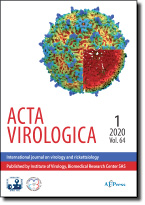Acta Virologica Vol.66, No.3, p. 254 – 262, 2022
|
| Title: Natural infection of purple passion fruit (Passiflora edulis f. edulis) by a novel member of the family Tymoviridae in Colombia |
| Author: Daniela Cardona, Andrea Restrepo, Mónica Higuita, Yuliana Gallo, Mauricio Marin, Pablo Gutiérrez |
|
Abstract: Purple passion fruit is one of the most important fruit exports of Colombia, but its productivity is being compromised by the emergence of several viral diseases. High-throughput sequencing (HTS) surveys of viruses in purple passion fruit fields in the province of Antioquia suggested infection by a new member of the family Tymoviridae. In this work, we characterize the complete genome sequence of this virus, tentatively named purple passionfruit leaf deformation virus (PpLDV), and evaluate its distribution in Antioquia. PpLDV was assembled at high coverage in four datasets from different regions. The 6.1 kb genome of PpLDV encodes a single polyprotein with domains characteristic of the family Tymoviridae, contains a marafibox-like promoter and the 3'-UTR can fold into a tRNA-like secondary structure with a valine anti-codon. Phylogenetic analysis of the polyprotein revealed that PpLDV is a distinct member of the family Tymoviridae, more closely related to the genus Tymovirus and the unclassified Poinsettia mosaic virus (PnMV). The presence of PpLDV was confirmed by RT-qPCR and RT-PCR in samples from commercial purple passion fruit fields, plantlets and seed sprouts collected in Antioquia using primers designed in this study.
|
|
| Keywords: high-throughput sequencing; Marafivirus; Passifloraceae; plant virology; RT-qPCR; Tymovirus |
|
|
Published online: 27-Aug-2022
|
| Year: 2022, Volume: 66, Issue: 3 |
Page From: 254, Page To: 262 |
doi:10.4149/av_2022_310
|
|
 download file download file |
|
|
|
|
 download file
download file
